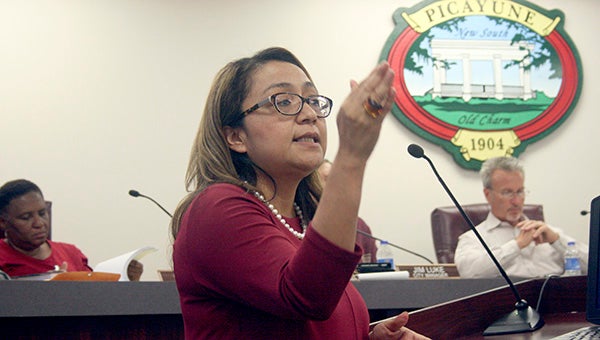Council approves water rate ordinance amendment
Published 7:00 am Thursday, April 7, 2016

PRESENTATION: Chamber of Commerce Director Nuria Arias gave the city council a presentation, which was also given to the county’s Board of Supervisors recently, about how the Chamber is working to promote economic development.
Photo by Jeremy Pittari
An ordinance to amend the current water rates in the city of Picayune was approved by the City Council Tuesday night.
Before the council voted to approve the new rates, discussion of the change outlined a long-standing need to adjust the rates to ensure the city was not losing money and also enable them to conduct necessary repairs.
City Clerk Amber Hinton said the city’s administration requested a rate study to determine if the Picayune’s rates were in line. Randy Turnage with Mississippi Rural Water Association, said the rates study began in 2013 and determined that profits are not coming in at the 10 percent margin the Health Department requires. He said the reason the city needs to reach that margin it to ensure they will have the funds on hand to maintain and repair the system, in addition to be able to retire any debt involved in maintenance. Turnage said the rates proposed in the ordinance should bring the city to that margin.
Public Works Director Eric Morris said the city is currently losing $150,000 per year in water leaks and other water system losses.
The biggest change residents will notice, besides the increase in the rate, is the minimum for all residential and commercial accounts within the city limits has been reduced from 4,000 gallons to 3,000 gallons. Residential and commercial customers outside the city limits were already capped at a minimum of 3,000 gallons.
The changes outlined in the new ordinance state homes within the city limits will be charged $18.50 for the first 3,000 gallons, instead of $16.25 for the first 4,000 gallons. An additional 1,000 gallons will now cost residents living in the city limits $3.25 instead of $2.15
Homes outside of the city limits will be charged $33 for 3,000 gallons instead of $32.75. An extra 1,000 gallons for those homes will now cost $4.75 instead of $3.75.
Commercial entities within the city limits will pay $22 for the first 3,000 gallons instead of $21.25 for 4,000 gallons. An additional 1,000 gallons will cost $4.75 instead of $3.75.
Commercial entities outside of the city limits will pay $41 for the first 3,000 gallons instead of $32.25 for the first 3,000 gallons. An additional 1,000 gallons will cost $4.75 instead of $3.75.
Industrial customers will pay $41 for the first 5,000 gallons instead of $40 for the first 10,000 gallons. An additional 1,000 gallons will increase by one dollar from $2.15 to $3.15 for those customers.
Councilor Larry Breland expressed concern about residents on fixed incomes, especially the elderly, if they get disconnected or fall behind on payments. Hinton said the city will make an exception to set up a payment plan once per year if the customer can show they were dealing with extenuating circumstances, but they will still have to pay the $50 reconnection fee if the service was disconnected.
Turnage said, for the most part, residents living alone or with only one other person would not use more than 3,000 gallons. He also said most cities have a minimum of 2,000 gallons.
The changes to the rate structure will bring the city within the 10 percent profit margin, or bring in an additional $2.1 million per year. Morris said the profit will allow the city to apply for State Revolving Fund loans, up to $5 million per loan, that will allow the city to conduct citywide renovation projects to rehabilitate the city’s aging water system. He said many of the lines currently in use were installed in the 1960s and as such are decaying, leading to the water leaks city employees spend much of their time repairing. Morris estimates it will take about $20 million to rehabilitate the entire city, or about four of the loans. Bringing the water system to a profitable state will allow the city to apply for those loans, and effectively pay them back, Morris said.
The last rate increase implemented in Picayune occurred in 2008, said Councilor Wayne Gouguet.
When the council took a vote on approving the new ordinance, Gouguet, Mayor Ed Pinero, Councilor Tammy Valente and Councilor Janice Miller Stevens voted for the change, while Breland and Councilor Lynn Bogan Bumper voted against it.
Hinton said that the changes will not be seen on customer bills until the June billing.
The next council meeting will be held April 19, at 5 p.m.




